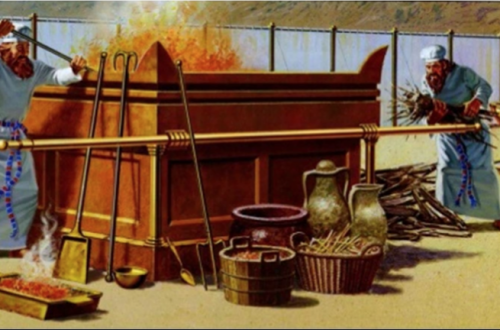God’s glorification and vindication of believers
Romans 8:26–39 is part of the lectionary readings for the eighth Sunday after Pentecost, which is July 26th. In 7:1–12, Paul described how sin (personified as a despotic power) used the Mosaic Law to arouse the desire for iniquity within people.
When believers trusted in the Son, their relationship to the Law was severed. In turn, this undercut a major way sin exercised its unchallenged authority in their lives.
Next, in verses 13–25, the apostle described what life dominated by the sinful nature looked like. He affirmed how easy it was for people to succumb to sin’s control. He also revealed that it was only through faith in the Son that true spiritual freedom was possible.
In chapter 8, Paul detailed how God’s grace delivered believers from the wretched state of existence the apostle lamented in 7:24. He explained that because Jesus was able to rescue those who once were slaves to sin, there was no condemnation for them in baptismal union with Him (8:1).
Through the Son’s sacrificial death on the cross, the Father pardoned repentant, believing sinners. Moreover, the Spirit released them from the consequences of the law of sin and death.
Paul used the Greek noun rendered “law” twice in verse 2 to describe distinctive controlling powers. Specifically, the apostle referred to the controlling power of the Spirit, who freed believers from the controlling power of sin and death.
The Spirit is mentioned no fewer than 19 times in Romans 8. Paul placed emphasis on this member of the Trinity because His role was pivotal to the spiritual life of believers.
For instance, the Spirit brought people to new life at salvation (Titus 3:5). Also, as described in Romans 8, the Spirit acted as a controlling power in the lives of the regenerate so they could overcome sin (v. 2).
Whereas the Law was holy and pointed people to God’s perfect moral standard, sin rendered the law powerless by using it to provoke disobedience (7:5, 11–12). So, attaining righteousness by keeping the Law was impossible.
What the Law could not do (provide acquittal for humanity), the Father did through the offering of His Son as payment for sin (8:3). By one act of obedience, Jesus condemned sin (to crucify the old self) and made provision for righteousness (to empower the new self).
When a person became a Christian, an amazing exchange occurred. The new believer’s sinfulness was transferred to the Son on the cross and His perfect righteousness was transferred to the new Christian.
Through the above exchange, the requirements of the Law were met in full. Jesus’ righteousness in the believer enabled that person to consistently live according to the Spirit, rather than according to the sinful state (v. 4). When Paul used the Greek term literally rendered “flesh,” he meant an unregenerate condition, natural to people, in which the Creator and the spiritual realm were disregarded.
Verses 5 through 17 describe the sharp contrasts that existed between the sinful and redeemed states of existence. For instance, the sinful state was focused on gratifying the cravings of the flesh. The redeemed state endeavored to accomplish the will of the Spirit.
The sinful mind led to death. The redeemed mind led to life in union with the Son. The sinful mind was hostile to God, for it refused to submit to His Word. The redeemed mind was motivated by love for God to obey His Word.
The sinful mind was enslaved to fear. The redeemed mind was a bondservant of righteousness.
Those who did not have the Spirit also did not belong to the Son. The Spirit confirmed to believers that they were God’s children.
Those who lived according to the sinful state experienced unending separation from God. Those who lived according to the Spirit enjoyed unending communion with God.
In verse 18, Paul affirmed that the suffering believers endured would be outweighed by the glory to be revealed in them. The believers’ affliction was always temporary, but their glory in union with the Son would never end (2 Cor 4:17).
When Paul wrote about the present age and the glory yet to come, he borrowed concepts that were familiar to ethnic Jews of his time. In this regard, Jewish thinking included two eras: (1) the present, corrupt age, which was completely given over to sin, decay, and death; and, (2) a new, restored world that would follow a day of judgment.
Paul revealed that currently every aspect of creation was subjected to God’s curse (Rom 8:20). Adam had been assigned to a position of authority over creation as God’s representative (Gen 1:26–30; 2:8, 15).
So, when God’s judgment came against humanity in the ancient Eden orchard, all creation was adversely affected (3:17). Yet, a time was coming when creation would be free from the influences of sin, Satan, and physical deterioration (Rom 8:21).
What awaited creation also lay ahead for Jesus’ followers (vv. 22–25). Their confident expectation was that at His return, He would finally deliver them from an existence dominated by sin and characterized by decay and death.
Paul disclosed that prior to Jesus’ second advent, believers were not left to wait alone, enduring their afflictions without a comforter. The Spirit helped them in their weaknesses and frailties (v. 26).
Though believers might be at a loss concerning what to pray for, the Spirit unceasingly pleaded their case before the Father. Also, the Spirit did so with groanings that could not be expressed in words.
The Father, who continually searched the hearts of His children, also had perfect and complete knowledge of the Spirit’s “mind” (v. 27). So, the Spirit’s utterances did not need to be conveyed using human language, especially since the Father was intimately familiar with the Spirit’s heart.
Next, Paul reiterated what his readers already knew and affirmed. Specifically, the Creator brought an eternally beneficial outcome in every circumstance His children experienced.
That “good” (v. 28) result was in accordance with God’s redemptive plan, which included summoning and enabling the lost to trust in the Messiah, along with becoming Jesus’ coheirs in His future kingdom (v. 17). The Father’s will also included believers loving Him wholeheartedly and showing kindness to their fellow human beings (Deut 6:4; Lev 19:18; 1 Cor 2:9; 8:3; Eph 6:24).
Admittedly, many difficult circumstances arose in the lives of Christians. Also, while these hardships could feel overwhelming, God used them to bring about Christlike fruit in the lives of believers.
Romans 8:28–30 focuses on God’s glorification of believers. Whereas verse 28 concerns the divinely intended outcome, verses 29–30 deal with the underlying process of the believers’ call to salvation.
In particular, those whom the Father lovingly chose in eternity past, He also determined in advance to become spiritually like the Son (Eph 1:4; 2 Thess 2:13; 1 Pet. 1:20). The divine intent was that Jesus would be exalted as the “firstborn” (Rom 8:29; or “preeminent one”) among the redeemed (Col 1:15, 18), whom the Spirit was conforming to the Son’s “image” (1 Cor 15:49; 2 Cor 3:18; Phil 3:21; 1 John 3:2).
Moreover, these are the same individuals whom the Father regenerated (through the means of grace), declared to be not guilty (as a result of their trust in the Savior), and “glorified” (ultimately through their resurrection from the dead; Rom 8:30). Each of the main verbs in verses 29 and 30 are in a Greek tense denoting a past action that remained true in the present.
The Creator was the active agent in bringing about the full and final redemption of believers. Also, even though that outcome would not occur until the Son’s future return, the Father regarded it as an already accomplished fact that affected the daily lives of believers.
There are at least two distinct views of what predestination means when it is discussed in Scripture. One option—technically referred to as decision theology (prevalent among evangelicals)—is that the Father gives all people enough grace to accept the offer of salvation. This remains true, even though many reject His undeserved kindness. In this way, the Father predestines some for redemption in the sense that He knows beforehand those who will decide to believe the truth of their own independent choosing.
A second option—which prevails within confessional Lutheranism—is that people are so debased by sin that they are unable on their own to respond to the offer of salvation made available in the Son. According to this view, those who believe have the ability to do so only because the Father previously selected them for redemption. Put another way, He gives them grace, and this enables them to believe the truth.
Ephesians 1:11–12 discloses that the Father’s eternal plan for His children did not occur by accident. Instead, He brought it about through the atoning sacrifice of His Son at Calvary. In fact, the Father’s grand design was to bring everything together—whether in heaven or on earth—under the Son’s supreme authority.
The Father also planned that believing Jews and Gentiles would receive an eternal inheritance. One could even say that they became the Creator’s eternal inheritance based on what Jesus did on the cross. In turn, this outcome resulted in unending praise for God.
After Paul said that God had marked out wonderful plans for those who followed His purposes (Rom 8:28–30), the apostle concluded (through the use of a series of rhetorical questions) that believers had several reasons to live with confidence as God’s redeemed people. Specifically, no one could successfully thwart believers receiving their eternal inheritance, for the Creator was on their side (v. 31).
Also, through their faith in God, Christians were protected by His power to receive salvation on the last day (1 Pet 1:5). These truths notwithstanding, God was not in support of a believer’s self-serving agendas, especially any that were contrary to His will.
Paul declared that the Father would not withhold from His children anything necessary for their redemption. After all, like Abraham—who, when divinely directed, did not spare Isaac (Gen 22:16; Heb. 11:17–19)—the Father offered His greatest gift—His own Son—when Jesus died on the cross for humanity’s sins (Isa 53:6, 12; John 3:16; Rom 5:6–8).
The above greater truth being so, the lesser truth was equally valid, namely, that God would bestow on believers whatever He knew to be essential to accomplish His eternal plans for them. These were brought to fruition because of what Jesus accomplished at Calvary on behalf of the lost.
Although God was on the side of His children, it remained an open question as to whether they were always and consistently on His side. For them to be victorious in their Christian walk, they first had to yield their aspirations to the Lord. Put differently, to align themselves on God’s side, their desires and ambitions had to submit to His plan.
Also, the Father showed, by sacrificing His Son for the lost, that He desired the absolute best for believers. They could be sure, even when circumstances seemed out of control or unbearable, that God was working out His ultimate good in the lives of Jesus’ devoted followers.
Believers could serve God with confidence, for He would not permit any adversary to impugn His children. After all, He had chosen them and declared them to be righteous (Rom 8:33; see Isa 50:8–9).
Even today, it would be unthinkable for people to be arrested for a crime if others have already turned themselves into the authorities. Similarly, Jesus paid the penalty for His disciples’ sins.
Furthermore, no one could render a guilty verdict against believers, since Jesus died, rose again, and now interceded on their behalf in the place of honor at God’s “right hand” (Rom 8:34; see Ps. 110:1; Matt 26:64; Acts 2:33–34; 5:31; 7:55–56; Eph 1:20; Col 3:1; Heb 1:3, 13; 8:1; 10:12; 12:2; 1 Pet 3:22). In His death and resurrection, Jesus assumed the blame for His followers’ transgressions.
Jesus was like a defense attorney who declared, “I take responsibility for these crimes and shoulder the consequences. So, no sentence can be given to my clients” (Heb 4:14–16; 7:25; 1 John 2:1–2).
Since the Father exonerated repentant, believing sinners, He left no grounds for potential accusers to assail His children. Even Satan could not do so, though he would like to (Rev 12:10). In the heavenly court of divine justice, Christians were already vindicated (v. 11).
Admittedly, in the secular realm, it would be unheard of for a defense attorney to bear the punishment of a client. Yet, that is what Jesus did for the lost. He made it impossible for those who trusted in Him to be held liable for their iniquities.
Even though Jesus led a life totally free from sin (Heb 7:26; 1 Pet 2:22), He became an offering for humanity’s misdeeds (2 Cor 5:21). At Calvary, He took the place of the lost as their substitute and bore the judgment they deserved.
Paul asked whether there was any entity that could isolate believers from the unconditional, self-sacrificing “love” (Rom. 8:35) Jesus had for them. Paul mentioned seven afflictions—all of which he personally experienced (1 Cor 4:10–13; 2 Cor 6:4–5; 11:22–27). None of these possibilities—not trouble (“pressure,” “distress”), hardship (“being pressed in”), persecution, famine, nakedness, danger, or the sword—could separate Christians from their Savior’s compassion for and commitment to them (Rom 8:35).
Paul quoted from Psalm 44:22 to emphasize that the redeemed, while in the world, would face adversity—perhaps even martyrdom (Rom 8:36; see Acts 14:22; Phil 1:29; 2 Tim 3:12). In all such difficulties, believers were more than triumphant through their baptismal union with the Messiah (Rom 8:37). Believers not only won their battles, but in the end, they enjoyed Jesus’ abiding presence.
Paul exulted in the fact that nothing could sever believers from the Father’s covenantal love for them in baptismal union with the Son (vv. 38–39). The apostle provided a series of items to illustrate his point. Most of these are in pairs—the extremes of existence (death, life), spiritual armies (angels, demons), time (present, future), and space (height, depth).
None of these potentialities—at either extreme—could drive a wedge between the Creator and His children. Indeed, the apostle declared with certitude that it was impossible for the redeemed to be cut off from God’s mercy and pardon.
The examples Paul gave in verses 38 and 39 indicate spiritual temptations as much as physical enticements. This is why the apostle included “angels” as a possible opponent to God’s love.
Some suggest Paul was consistent with a prevalent Jewish understanding of angels in the first century a.d., namely, that angels are evil. Others say these angels should be understood as good, suggesting that no such angel would seek to come between God’s love and believers. In contrast, “demons” are wicked spirits and would be happy to separate believers from God’s love.
Moreover, time could not separate believers from God’s love—whether present time with its temptations and sufferings, or future time with its unpredictability. Neither could “powers,” which probably refers to spiritual forces engaged in warfare against believers (Eph 6:12).
“Height” (Rom 8:39) and “depth” could refer to the level of believers’ emotional or spiritual mood. Some think their depression cancels God’s love for them. Yet, Paul said the believers’ fluctuating feelings did not undermine the stability of God’s commitment to them.
Some specialists see astrological terms in Paul’s references. Astrology dominated the thinking of people in Bible times, who believed that a person’s destiny was determined by the star under which he or she was born.
In this way of thinking, “height” denoted a star at its peak, when it was most influential. “Depth” referred to the star at its lowest point, waiting to regain control. According to this view, Paul was telling those influenced by astrology that the stars could not hurt them and certainly could not separate them from the Creator’s love.
Key ideas to contemplate
The reason believers will endure to the end is that they belong to God. He included them in His gracious purpose of salvation, and He is working according to His grace to bring them to the eternal glory. Romans 8 makes certain assurances to those who are justified by grace through faith in the Son. As believers, Christians are …
1. Assured of suffering. Being the recipients of God’s grace does not alleviate us from enduring persecution and hardships. Indeed, Paul assured his readers that sufferings would come. Yet, he added that “our sufferings at the present time are not worth comparing with the glory that is going to be revealed to us” (v. 18).
2. Assured of glory. This glory is the complete fulfillment of God’s plan for redeemed humanity since the inception of creation. Not only will all creation attain its fullest potential, but also all of redeemed humanity will attain its fullest potential when those who are baptismally united with the Son by faith are resurrected to enjoy their ultimate salvation.
3. Assured of help in our distress. We are never left alone in our distress. The Lord is always there for those who “love God, for those who are called according to his purpose” (v. 28). The Spirit will bring us comfort, stamina, and direction when we need them. Also, even if we seem to have lost our way and don’t know what to pray for, the Spirit is still with us, praying in our stead and in harmony with the Father’s will.
4. Assured of victory. We will be opposed. We will have spiritual battles. We will face temptations. Hardships, distresses, persecutions, famines, and perils will come our way. Yet, because Jesus has fought for us and won, we are already victorious in the midst of all opposition. We are already “more than conquerors through him who loved us” (v. 37).




